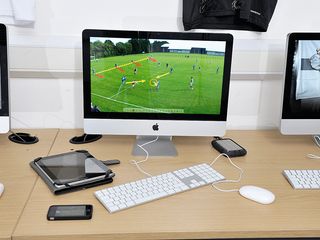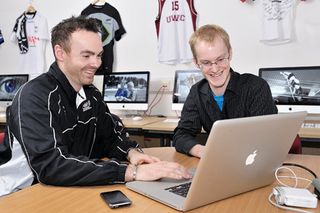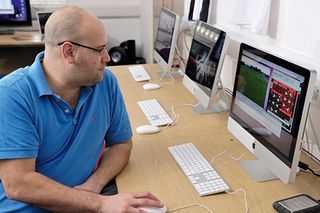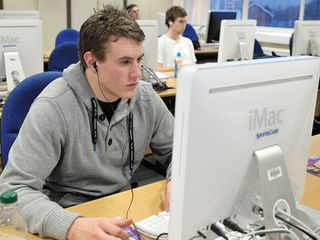How Mac apps are transforming world sport
Teams are turning to Macs to get that vital edge over opponents

Say you were to meet former England rugby captain Steve Borthwick in a bar - what would you talk about once the rugger conversation dried up?
Well, you could bring up the subject of Macs, seeing as they play a key role in helping him - and hundreds of other elite athletes - prepare for their big games.
In football, you'll find Macs at Manchester United, Tottenham Hotspur and Everton, to name just a few Premiership sides. The England national team also uses them, as do the majority of top rugby union sides, national basketball teams and the West Indies cricketers.
With the help of highly trained performance analysts and software written specifically for the Mac, the Apple gear is vital in providing feedback to players about their performances, both during matches and training, as well as post-match. Not only that, it has become a key tool in preparing teams for forthcoming opposition tactics.
The analysis software of choice is Sportstec's SportsCode, which has been Mac-only ever since the company started a decade ago. Sportstec's UK CEO Jon Moore, himself a former rugby coach and analyst with the Welsh Rugby Union and Bath Rugby, revealed that there was only ever one choice of computer for SportsCode to run on.
"The basis was choosing a platform that was going to give us the functionality range that we wanted to achieve," he explains. "There was no question the Mac was going to give that cutting edge. It doesn't crash, it handles video, it compresses while we're in the middle of a performance and it enables us to have information immediately available to coaches during and after a performance."
From LA to Cardiff
Get daily insight, inspiration and deals in your inbox
Get the hottest deals available in your inbox plus news, reviews, opinion, analysis and more from the TechRadar team.
A glance at Sportstec's list of clients tells you that performance analysis is a seriously big deal in elite sport. As well as the teams we mentioned above, other users include Chelsea and Liverpool football clubs, David Beckham's LA Galaxy, FIFA, the majority of the top NBA basketball teams and the English national cycling team. Taken together, that's a lot of Macs in high-up places, so we decided to go to the epicentre of the revolution to find out what all the fuss is about.
Tucked away in a quiet suburb of the Welsh capital at the University of Wales Institute Cardiff (UWIC) is the Centre for Performance Analysis (CPA), which is leading the way in performance analysis research and teaching. It's here that a dedicated team of top coaches, analysts and technicians is constantly pushing the boundaries of performance analysis, and training the next generation as part of their postgraduate courses.
From the moment you walk in, it's clear they love anything Apple-related. As we sit in a lab full of the latest 21-inch iMacs, coaches come and go with iPads tucked under their arms or iPhones pressed to their ears. Even the routers are Apple AirPort Extremes, selected in favour of cheaper alternatives for the simple reason that they work so seamlessly with the rest of the Apple kit.
SportsCode's a complex and powerful bit of software that's been designed with ease of use in mind so analysts, coaches and players alike can use it. Before a match or a training session, coaches work with analysts to determine what aspects of play they want to focus on and this is coded into what's called a template.
So in basketball, one such example could be every time a player blocks an opposition's shot. As play begins, a live video stream is fed from a DV camera into the analyst's Mac. With footage rolling in, the analyst attaches appropriate tags to the video. That way, when the coach wants to see all occasions when shots were blocked by opponents, he can watch all the clips one after the other, with no need to rewind or fast-forward long reams of footage.
Given time, this can lead to a huge database of clips that players and coaches can look back on, to gauge progress over a period of time.
Model pros
The assistant coach of the Great Britain women's basketball team, Damian Jennings, is in no doubt about the importance of the Mac's role in performance analysis.

MACS AT WORK: Basketball coach Damian Jennings talks us through some of his recent match analysis
"After four years of using the Mac for performance analysis at UWIC, it's become part of the fabric of what the players do here," he explains. "The interesting test was last summer, when I took it to the GB team for the first time; they were blown away by it. They're used to watching VHS video, but with this we're able to get a Minority Report-style screen of various footage coming up of different situations.
"What the Mac and SportsCode enable you to do is get information fast and instantly respond to players' questions - perhaps about us getting out-rebounded by the opposition - rather than saying 'I'll get back to you tomorrow'. It becomes interactive, so they can ask to see specific aspects, and we can do that at the touch of a button," Jennings says.
As we chat to various coaches, it becomes clear that selling the idea of performance analysis with SportsCode has been made infinitely easier by the fact it runs on Macs.
"If you look at what computers all the players have, they've all got Macs," Jennings enthuses. "Last night we had a performance analysis session where they had to take notes, and about half of them were writing on Macs as opposed to hand-writing."
"It's trendy, isn't it?" Moore agrees. "Everybody wants a Mac, and when you realise how easy and intuitive it is to use, it only takes a short spell with a young player to show them what a Mac can do compared to a PC.
"The players have often got iPhones anyway, so the Mac's an easy sell. It's about lifestyle and empowerment - I was a carpenter and joiner, then for over 20 years I was a professional coach before I became manager of this software. I've come through various different types of employment, but I can manage my own web page, I can video stream - Mac means empowerment."
The Mac bug has bitten plenty of players after they witness the machines used in their performance analysis. Moore goes on: "I've got young players who I mentor, and I use iChat and video chat with them. I can be 200 miles away, sharing their desktop and showing them vital critiques of their game. Tell me how I could do that on a PC without it being too complicated…" He pauses to allow for a response, but you can tell he doesn't expect an answer.
Darrell Cobner, the Director of the CPA who worked with the English rugby union team that won the World Cup in 2003, reflects on his experience.

WINNING COMBINATION: CPA director Darrell Cobner worked with the English rugby World Cup-winning side in 2003
"If you go back to when I was with England rugby, you had the old guard who have been in the game for a long time, who know it inside out and know what they're doing. They probably don't need performance analyses because they're going to reflect on their own performances. But with some of the younger groups, such as the under-21s, you're exposing them to it when they're a bit more familiar with computers in the first place.
"One player who really got to grips with the lineout side of it was Steve Borthwick. He'd take a collection of opposition lineouts and got in amongst the video to know what they were going to do against us," Cobner explains.
The new breed
A smile comes across Moore's face at the mention of the former England Captain. "At that time, I was the Forward and Scrum Coach at Bath," he says. "Steve was one of the first players to say 'I'm buying a Mac'. He was then asking if he could take the footage home to look at. He was the new breed of professional who understood he was investing in a Mac and investing in his future.
"And it made a difference. He was a player who'd just broken into the first team, and we would count his significant moments in a game. When he started, he'd just be breaking into double figures. But studying and looking at situations, and working with the Mac and software to understand how he could deploy himself better, he went up to 30-plus moments in a short period of time," Moore enthuses. "He was the first player to say 'Where's the game, where are my individual moments? Jon, will you sit down with me and go through them?'
"And through that period of sitting with him, we ended up setting up a room where the players could come to look at footage."
Players reviewing and analysing their own footage is something several coaches touch on, and the simplicity of the Mac platform is one of the key enablers. Huw Wiltshire, who spent many years with the Welsh Rugby Union, most recently as their performance manager, is a big advocate of the difference it has made to modern athletes.

TRAINING TOOL: The CPA is the training ground for the next generation of top performance analysts
"When you get players reviewing their performances, you know you're getting the right message through to people, because you've got a player being proactive to the point where they want to generate their own self-analysis or an analysis of the opposition. It's leading us to more self-sufficient athletes," he says.
"The difference I've seen in 15 years of professional rugby is that players are far more educated and critical in a constructive fashion.
"Ultimately, what a lot of the Mac software does is provide simple, clear direction. You don't want people paying lip service, just saying 'Oh, I've done my analysis'. You want them to use it for a purpose, and the Mac is a really powerful piece of kit from a number of perspectives. From the laptop to the iPad and iPhone, to the fact that you can sync and get a congruence between the three, it's a complete performance solution."
- 1
- 2
Current page: How Mac apps are transforming world sport
Next Page Real-time feedback to the teams